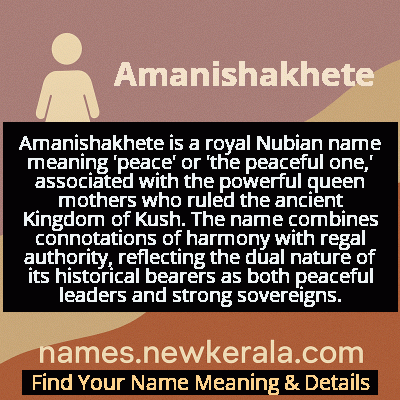Amanishakhete Name Meaning & Details
Origin, Popularity, Numerology Analysis & Name Meaning of Amanishakhete
Discover the origin, meaning, and cultural significance of the name AMANISHAKHETE. Delve into its historical roots and explore the lasting impact it has had on communities and traditions.
Name
Amanishakhete
Gender
Female
Origin
African
Lucky Number
7
Meaning of the Name - Amanishakhete
Amanishakhete is a royal Nubian name meaning 'peace' or 'the peaceful one,' associated with the powerful queen mothers who ruled the ancient Kingdom of Kush. The name combines connotations of harmony with regal authority, reflecting the dual nature of its historical bearers as both peaceful leaders and strong sovereigns.
Amanishakhete - Complete Numerology Analysis
Your Numerology Number
Based on Pythagorean Numerology System
Ruling Planet
Neptune (Ketu)
Positive Nature
Intuitive, analytical, spiritual, and inquisitive.
Negative Traits
Secretive, reserved, aloof, and can be overly critical.
Lucky Colours
Green, yellow.
Lucky Days
Monday.
Lucky Stones
Cat’s eye, moonstone.
Harmony Numbers
1, 5, 6.
Best Suited Professions
Scientists, researchers, spiritual leaders, detectives.
What People Like About You
Depth of knowledge, analytical skills, spirituality.
Famous People Named Amanishakhete
Amanishakhete
Kandake (Queen Mother) of Kush
Ruled during height of Meroitic power, built significant monuments including her pyramid at Meroë
Amanirenas
Kandake of Kush
Successfully defended Kush against Roman invasion, negotiated favorable peace terms
Amanitore
Kandake of Kush
Co-ruler during Kushite golden age, oversaw extensive temple construction and economic prosperity
Name Variations & International Equivalents
Click on blue names to explore their detailed meanings. Gray names with will be available soon.
Cultural & Historical Significance
The name connects modern African peoples to a heritage of political independence and cultural achievement. During Amanishakhete's era, Kush maintained its sovereignty despite the expansion of Roman power in neighboring Egypt. The name symbolizes African resistance to colonialism and the continuity of indigenous governance systems. For contemporary African diaspora communities, Amanishakhete represents a reclaiming of pre-colonial identity and a celebration of Africa's rich historical narrative beyond the trauma of slavery and colonization.
Extended Personality Analysis
Those bearing the name Amanishakhete are often characterized by a unique blend of strength and serenity. They typically possess natural leadership qualities, demonstrating both the authority to command and the wisdom to listen. Their decision-making tends to be deliberate and well-considered, reflecting the strategic mindset required of ancient rulers who balanced military defense with diplomatic relations. There's often a regal dignity in their demeanor, not as aloofness but as self-assured presence that naturally commands respect.
Beneath this authoritative exterior lies a deep commitment to peace and harmony, true to the name's meaning. Amanishakhete personalities often serve as mediators in conflicts, using their diplomatic skills to find solutions that honor all parties. They tend to be protective of their communities and traditions while remaining open to progressive ideas. Their strength is not aggressive but rather emerges as resilience and steadfastness in the face of challenges. They embody the ideal of leading through inspiration rather than intimidation, making them effective in positions of responsibility where they can guide others toward collective wellbeing.
Modern Usage & Popularity
In modern contexts, Amanishakhete is primarily used within communities seeking to honor African heritage and female empowerment. While the full name remains uncommon due to its length and historical specificity, it has seen increased interest among African diaspora families researching pre-colonial names. The shortened form 'Amani' has gained significant popularity across various cultures, particularly in East Africa where it means 'peace' in Kiswahili, and among African Americans embracing Pan-African identity. The name appears occasionally in academic circles, historical fiction, and cultural organizations focused on Nubian studies. Its usage represents a conscious choice to celebrate Africa's royal history and challenge Eurocentric narratives about African civilization. Recent years have shown a slight uptick in usage as social media facilitates greater awareness of ancient African history and as more parents seek meaningful names with cultural depth.
Symbolic & Spiritual Meanings
Amanishakhete carries rich symbolic meaning as a representation of African sovereignty, feminine power, and cultural continuity. The name symbolizes the ideal of peaceful leadership—the ability to maintain harmony while exercising authority, reflecting the dual meaning of strength and peace inherent in its structure. It stands as a metaphor for African civilization's resilience and sophistication, challenging stereotypes about pre-colonial Africa. The name also symbolizes the reclamation of historical narrative, serving as a bridge connecting contemporary African peoples to their ancient heritage. In a broader sense, Amanishakhete represents the often-overlooked tradition of female governance in ancient societies, offering an alternative model of leadership that combines maternal protection with royal authority. The symbolic power of this name lies in its ability to simultaneously reference peace ('Amani') and queenly power ('shakhete'), creating a holistic vision of leadership that remains relevant across centuries.

